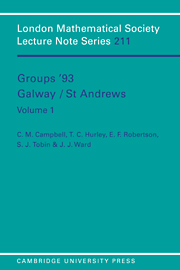Book contents
- Frontmatter
- Contents
- Preface
- Introduction
- Geometry, Steinberg representations and complexity
- The structure of metabelian finite groups
- Table algebras of extended Gagola-type and applications to finite group theory
- On the saturation of formations of finite groups
- Locally constructed formations of finite groups
- Reflections on virtually one-relator groups
- Rickard equivalences and block theory
- Computing the conjugacy classes of elements of a finite group
- Quotient categories of modules over group algebras
- Weak chain conditions for non-almost normal subgroups
- Computation of the character table of affine groups using Fischer matrices
- The lattice of compact representations of an infinite group
- Automorphisms of nilpotent and related groups
- Generation of orthogonal groups over finite fields
- The structure of certain Coxeter groups
- n-free groups and questions about universally free groups
- Classification of all generating pairs of two generator Fuchsian groups
- Parametric words and models of the elementary theory of non-abelian free groups
- The groups G(n, l) as fundamental groups of Seifert fibered homology spheres
- Lifting automorphisms: a survey
- (MI)-groups acting uniserially on a normal subgroup
- Revisiting a theorem of Higman
- Cohomological finiteness conditions
Quotient categories of modules over group algebras
Published online by Cambridge University Press: 02 March 2010
- Frontmatter
- Contents
- Preface
- Introduction
- Geometry, Steinberg representations and complexity
- The structure of metabelian finite groups
- Table algebras of extended Gagola-type and applications to finite group theory
- On the saturation of formations of finite groups
- Locally constructed formations of finite groups
- Reflections on virtually one-relator groups
- Rickard equivalences and block theory
- Computing the conjugacy classes of elements of a finite group
- Quotient categories of modules over group algebras
- Weak chain conditions for non-almost normal subgroups
- Computation of the character table of affine groups using Fischer matrices
- The lattice of compact representations of an infinite group
- Automorphisms of nilpotent and related groups
- Generation of orthogonal groups over finite fields
- The structure of certain Coxeter groups
- n-free groups and questions about universally free groups
- Classification of all generating pairs of two generator Fuchsian groups
- Parametric words and models of the elementary theory of non-abelian free groups
- The groups G(n, l) as fundamental groups of Seifert fibered homology spheres
- Lifting automorphisms: a survey
- (MI)-groups acting uniserially on a normal subgroup
- Revisiting a theorem of Higman
- Cohomological finiteness conditions
Summary
Introduction
The following paper is a report on recent progress in the study of quotient categories of modules over modular group algebras. The investigation began with joint work by the author, Peter Donovan and Wayne Wheeler [CDW]. Continuations have involved collaborations with Wheeler [CW] and Geoff Robinson [CR]. Extensions of the theory to more general groups and coefficient rings are undoubtedly possible, but the investigation to this point has been restricted to the case in which G is a finite group and k is an algebraically closed field of characteristic p > 0. This case will be assumed throughout this paper. Also we assume that all kG-modules are finitely generated.
The quotient category construction is essentially a localization process, in the sense that the groups of morphisms between objects in the quotients are localized versions of the ext groups in the ordinary cohomology. In this way the quotient construction is a means by which we can highlight certain properties of the module theory and of the cohomology. In addition, the investigation requires the adoption of an entirely new point of view. In the past few months the different viewpoint has led to new results in the study of modules with vanishing cohomology. Also many questions have been raised concerning the module theory and the role of the homological techniques. In reality, the study of the quotient categories is still in its beginning stages and many more applications should be expected.
- Type
- Chapter
- Information
- Groups '93 Galway/St Andrews , pp. 113 - 119Publisher: Cambridge University PressPrint publication year: 1995



